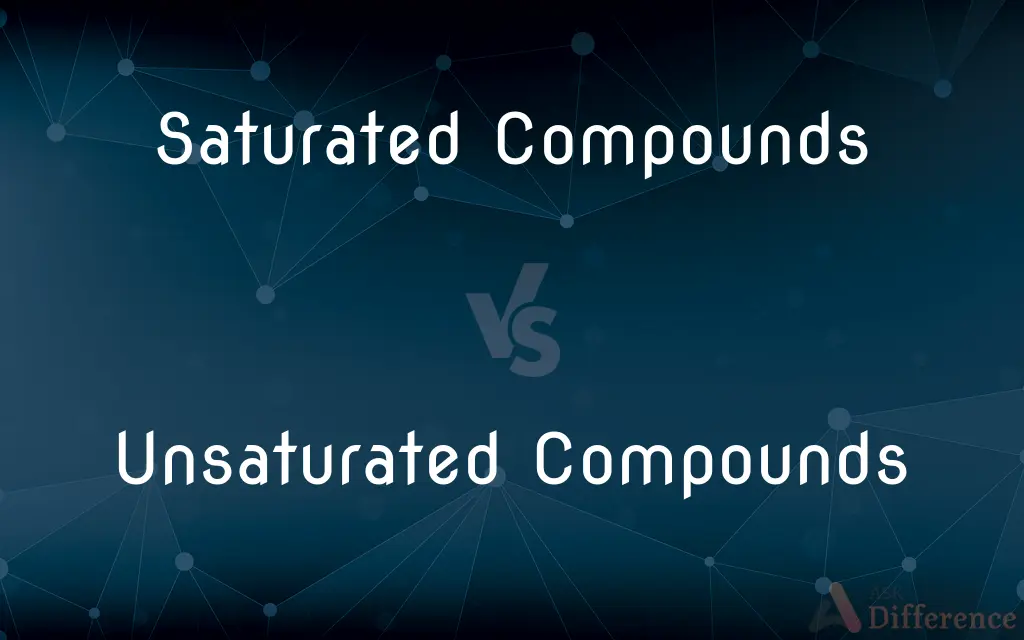Saturated Compounds vs. Unsaturated Compounds — What's the Difference?
By Tayyaba Rehman — Published on December 7, 2023
Saturated Compounds have no double or triple bonds between carbon atoms, while Unsaturated Compounds contain at least one double or triple bond.

Difference Between Saturated Compounds and Unsaturated Compounds
Table of Contents
ADVERTISEMENT
Key Differences
Saturated Compounds are those where all carbon-carbon bonds are single bonds. This implies the compound has the maximum number of hydrogen atoms possible. On the other hand, Unsaturated Compounds have one or more double or triple carbon-carbon bonds, implying they don't have the maximum hydrogen atoms.
The molecular stability of Saturated Compounds is generally higher. They are less reactive due to the absence of multiple bonds. In contrast, Unsaturated Compounds, with their double or triple bonds, tend to be more reactive and can undergo additional chemical reactions.
In terms of physical properties, Saturated Compounds typically have higher melting and boiling points compared to Unsaturated Compounds. This is attributed to the strong single bonds that require more energy to break.
From a dietary perspective, Saturated Compounds, often found in animal fats, are considered less healthy when consumed in excess. Unsaturated Compounds, found in many plant oils, are deemed healthier and beneficial for cardiovascular health.
Saturated Compounds are usually solid at room temperature, while many Unsaturated Compounds, especially those with multiple double bonds, remain liquid, giving them distinct physical appearances.
ADVERTISEMENT
Comparison Chart
Bond Type
Single carbon-carbon bonds
Double or triple carbon-carbon bonds
Hydrogen Content
Maximum hydrogen atoms
Less than maximum hydrogen atoms
Reactivity
Generally less reactive
More reactive due to presence of multiple bonds
Physical State at Room Temp
Usually solid
Often liquid
Health Implications
Often considered less healthy in excess
Deemed healthier, especially polyunsaturated ones
Compare with Definitions
Saturated Compounds
Compounds with only single bonds between carbon atoms.
Methane is one of the simplest Saturated Compounds.
Unsaturated Compounds
Compounds often liquid at room temperature due to weaker intermolecular forces.
Sunflower oil, rich in Unsaturated Compounds, remains liquid.
Saturated Compounds
Molecules that possess the maximum number of hydrogen atoms.
Butane, used in lighters, is a Saturated Compound.
Unsaturated Compounds
Chemicals that don't hold the maximum possible number of hydrogen atoms.
Olive oil contains Unsaturated Compounds beneficial for health.
Saturated Compounds
Chemical compounds that are less reactive due to lack of multiple bonds.
Paraffin wax contains Saturated Compounds and is unreactive.
Unsaturated Compounds
Typically more reactive and can undergo various chemical reactions.
Acetylene, an Unsaturated Compound, burns with a bright flame.
Saturated Compounds
Often found in animal fats and typically solid at room temperature.
Butter consists mostly of Saturated Compounds.
Unsaturated Compounds
Found abundantly in plant oils and considered healthier for consumption.
Omega-3 fatty acids are Unsaturated Compounds recommended for heart health.
Saturated Compounds
Compounds resistant to reactions like addition due to no double or triple bonds.
Propane is a Saturated Compound and doesn't easily participate in addition reactions.
Unsaturated Compounds
Molecules containing at least one double or triple bond between carbon atoms.
Ethene is an Unsaturated Compound with a double bond.
Common Curiosities
How are Unsaturated Compounds different?
They contain at least one double or triple bond between carbon atoms.
Which is generally more reactive, Saturated or Unsaturated Compounds?
Unsaturated Compounds are typically more reactive.
Can Saturated Compounds be converted to Unsaturated ones?
Yes, through certain chemical reactions like dehydrogenation.
Are all Saturated Compounds solid at room temperature?
Mostly, but not all. Some smaller ones can be gaseous.
What are Saturated Compounds?
They are compounds with only single bonds between carbon atoms.
Why are Unsaturated Compounds considered healthier?
They are often linked to heart health benefits and lower cholesterol.
What's an example of a Saturated Compound in daily use?
Butter predominantly contains Saturated Compounds.
Is it true that Saturated Compounds raise cholesterol?
Excessive intake is often linked to increased cholesterol.
Are all fats containing Saturated Compounds bad?
Not necessarily, but moderation is advised.
Where can Unsaturated Compounds commonly be found?
In many plant oils and some fish oils.
Which compound is more stable, Saturated or Unsaturated?
Saturated Compounds are generally more stable.
Do Unsaturated Compounds participate in addition reactions?
Yes, they readily undergo addition reactions due to their double or triple bonds.
How do Unsaturated Compounds impact heart health?
They can help reduce bad cholesterol and increase good cholesterol.
Can Unsaturated Compounds be hydrogenated?
Yes, they can be converted to saturated forms through hydrogenation.
Why are some Unsaturated Compounds liquid at room temperature?
They have weaker intermolecular forces due to the presence of double or triple bonds.
Share Your Discovery

Previous Comparison
PERT vs. CPM
Next Comparison
Linear Polymer vs. Crosslinked PolymerAuthor Spotlight
Written by
Tayyaba RehmanTayyaba Rehman is a distinguished writer, currently serving as a primary contributor to askdifference.com. As a researcher in semantics and etymology, Tayyaba's passion for the complexity of languages and their distinctions has found a perfect home on the platform. Tayyaba delves into the intricacies of language, distinguishing between commonly confused words and phrases, thereby providing clarity for readers worldwide.












































